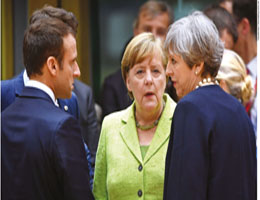BREXIT HURDLES
A HARD BARGAIN
Saro Thiruppathy addresses the snowballing problems facing the UK’s Brexit negotiations

On 29 March, British Prime Minister Theresa May invoked Article 50 of the Lisbon Treaty, signalling the withdrawal of the UK from the European Union (EU). The process is expected to be finalised in two years – i.e. by 29 March 2019.
Opinion polls in the spring saw May and her Conservative Party enjoying tremendous popularity and a 20-point lead over the Labour Party.
So when May suddenly announced on 18 April that she was calling a snap general election, the PM took almost everyone in Britain and the rest of the world by surprise – especially so since only two years had passed following her predecessor David Cameron’s election victory. So May was safe until 2020 as a result of the Fixed-Term Parliaments Act of 2011.
In fact, when asked by the BBC’s Andres Marr last September whether she would be inclined to capitalise on her healthy poll ratings and seek a fresh mandate from the people, she replied: “No. I think the next election will be in 2020… I’m not going to be calling a snap election.”
May justified her decision to call a general election by claiming she needed to strengthen her hand in Brexit negotiations; and she felt that with official Brexit talks set to commence in mid-June, she was concerned that Labour, the Scottish National Party (SNP) and Liberal Democrats (Lib Dems) would attempt to destabilise the process.
“If we do not hold a general election now, their political game playing will continue and the negotiations with the European Union will reach their most difficult stage in the run up to the next scheduled election,” the Prime Minister told the country.
She was hoping for a fresh five-year term that would allow her extra time to negotiate critical free trade agreements among other things.
However, several political commentators have observed that even though Brexit was the reason May offered, they believed that since opinion polls were extremely positive for the Tories, the PM was anticipating a landslide victory and a strong majority in parliament. She enthused: “Every vote for the Conservatives means we can stick to our plan for a stronger Britain and the right long-term decisions for a more secure future.”
But opinion polls are notoriously unreliable, and the election returned a much weaker Conservative Party – and a much stronger Labour Party. And if May had believed that she’d be able to mitigate the difficulties she was facing with the Brexit process through an election, she was sorely mistaken. Her problems only got worse following the general election.
Problems at home are many. They include issues such as the call by the Republic of Ireland for a sea border between Britain and Northern Ireland, as well as a demand by the Scots for trade security for their food and beverage export sector that forms a large part of the Scottish economy.
Moreover, the slow but steady exodus of EU citizens working in Britain’s public sector is causing labour shortages across the board. All this and more is giving the government cause for grief.
In addition to which there are serious problems arising from Brexit negotiations between the UK and the EU. France’s Michel Barnier is negotiating on behalf of the EU with his British counterpart David Davis – the Secretary of State for Exiting the European Union. As a result of some contentious issues on the rights of EU and British citizens, Barnier has requested the UK government to revert with responses to 14 points detailed in a colour-coded technical note.
According to Barnier, the “fundamental differences” on key issues include citizens’ rights and the Irish border. Speaking to the press, he added that there is a “fundamental divergence” on how the rights of EU citizens living in Britain and Brits living in EU countries can be protected after Brexit.
He said: “In the withdrawal agreement itself, citizens must be able to find the legal certainty that they need in their day-to-day lives… Clearly, any reference to European rights implies their oversight by the Court of Justice of the European Union.”
But this issue is a sticking point with May and a resolution does not seem to be in sight. Davis has noted that while “we agree on the need for certainty on the part of citizens of both the EU and the UK, we obviously have different views on how we can achieve that.”
Other problems include who will foot the ‘divorce bill,’ the UK’s obligations to the EU and securing trade deals before Brexit is finalised.
Another issue of concern is the European Union (Withdrawal) Bill, which The Mirror describes as “fiendishly complicated but drastically important.”
Among other things, the bill grants extensive powers to the government to implement new laws (called ‘statutory instruments’) that will not be debated in parliament and alter legislation without parliamentary approval. The relevant clauses have been nicknamed ‘Henry VIII clauses’ after the Statute of Proclamations 1539 that empowered the British monarch to legislate by proclamation.
Irrespective of the process, Brexit is a watershed moment for all Europeans as they face an uncertain future within a union that is fighting hard to stay relevant in the 21st century. At the same time, Britain’s future outside the EU will not be a bed of roses either, possibly resulting in a no-win scenario for both parties.



